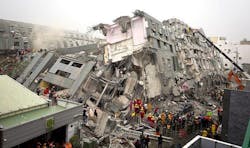To assess the key supply chain events of 2016, Resilinc released its EventWatch Annual Report which tracks information from the company’s supplier network. The report reviews incidents by risk type, industry, geography, severity, and seasonality.
“The earthquakes that impacted southern Taiwan and Japan in the first half of the year, and the bankruptcy declaration of Hanjin Shipping caused considerable disruptions to global supply chains,” said Shahzaib Khan, director of EventWatch at Resilinc.
“Also, 2016 saw a higher frequency of low impact disruption events over the previous year,” Khan added. “Business-related events such as Mergers & Acquisitions, Business Sale and Reorganization/Management Change were most common events notified.”
The report also reveals The EventWatch Top 5 supply chain events of 2016. The top 5 event ranking is driven by estimated aggregate revenue impact felt by manufacturers across the supply chain.
The top 5 events of 2016 in terms of impact to businesses, were:
1) 6.4 Magnitude Earthquake in Taiwan, February
2)Series of earthquakes in Japan, April
3)Typhoon Haima which hit Taiwan, China and the Philippines
4)Typhoon Napartak
5)Typhoon Megi, which both affected parts of Taiwan and China.
Key report highlights include:
- Mergers & Acquisitions represented the majority of EventWatch bulletins in 2016 with 20% of bulletins notified.
- Despite the increase in the total number of factory fire events notified in 2016, Factory Fires/Explosion dropped slightly from 17% in 2015 to 13% in 2016, falling to the second position for the first time.
- For the first time, life sciences overtook the automotive industry as the most frequently impacted industry, fueled by an increase in Merger & Acquisition and FDA/EMA Action bulletins.
- In 2016, the majority of supply chain events reported by EventWatch occurred in North America, overtaking Asia, which had the majority of events in 2015.
Two other important changes occurred in 2016 that have medium to long term supply chain impact potential, according to the report. These are, Brexit and the election of Donald Trump as President of the U.S. “While the impact to supply chains worldwide is not yet known or realized, these 2016 developments have the potential to change the makeup of global supply chains in the years to come,” the report said.
